By: debbie lynn elias
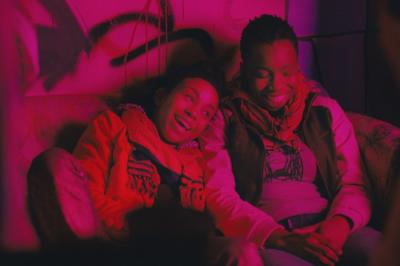
One of the biggest surprises to come out of 2011 is PARIAH, a glorious little indie film from Dee Rees that bodes two incredible performances – Adepero Oduye, a hot contender for a 2012 Spirit Award for Best Female Lead for her portrayal of Alike; and Kim Wayans, who, as Alike’s mother Audrey, blows the mind with a powerhouse dramatic turn. PARIAH is also a frontrunner for the John Cassavetes Award at the 2012 Film Independent Spirit Awards. Thoughtful and thought provoking, PARIAH is as relevant today as it will be 50 years from now, as we journey with Alike in this coming of age story and her struggle to be true to herself and who she is. And as heartfelt and powerful as the film is, what will stay with you long after the curtain falls is the authenticity, honesty and megawatt smile of the newest star on the Hollywood horizon, Adepero Oduye.
Alike (pronounced ah-LEE-kay) is the apple of her father’s eye and like most teen girls, is at odds 24/7 with her mother Audrey. Alike’s father, Arthur, is a cop while Audrey works for a medical clinic. Also in the mix is her younger sister Sharonda who, like all little sisters, can be a pain in the butt. To the world, the family seems almost picture perfect. Nice house, nice cars, both parents employed in respectable jobs, good children, church-goers. But behind the facade lie dark truths that are about to erupt.
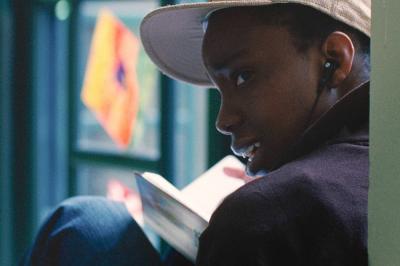
An intelligent straight-A student, Alike is shy, quiet and somewhat of a loner. Her inner solace comes from writing poetry. Much to the dismay of Audrey, Alike’s only real friend is Laura. Comfortable with her sexual identity and preference for women, Laura is considered far too manly by Laura and not the type of influence she wants for Alike as she sees Alike becoming more like Laura and not as “frilly and feminine” as she wants her to be. What Audrey doesn’t see – or want to see – is that Alike is at a crossroads in her life where she is internally embracing her identity but looking for the comfort and acceptability of a relationship, and the courage to tell her parents and have them accept her.
Struggling with her emotions, Alike is soon thrust into a friendship with Bina, daughter of a church-going Christian woman who is friends with Audrey. Unbeknownst to Bina’s mother and Audrey, Bina herself is bi-curious and sees Alike as an answer to her own questions.
Adding to the family dysfunction is the strained marriage between Audrey and Arthur. Herself a frustrated wife (in more ways than one), Audrey also bears resentment to Alike for her closeness to her father. There is never a question that alike is Daddy’s Little Girl, which also creates great emotional angst as Daddy doesn’t want to see Alike grow up.
But what happens when Alike’s emotions are toyed with by Bina, Audrey and Charles come face-to-face with their own marital failures and who their daughter really is, and Alike is left standing seemingly alone to navigate the emotional floodgates of life?
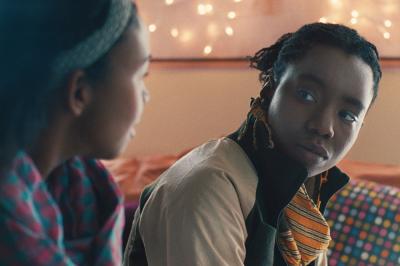
Hold on to your hats folks as you watch Adepero Oduye’s Alike. She just lights up the screen. And when expressing happiness, she has a 1000 watt smile that you can’t help but love. A courageous and emotionally powerful performance, 33 year old Oduye, brings all the angst of a 17 year old teen, let alone a teen in conflict on issues of sexuality, giving an extremely dynamic and emotionally charged performance. Oduye is as adept at conveying nuanced quiet pain as she is with goofy teen-aged giddiness. One minute you feel yourself soar with her joy and the next you ache with her pain. Describing achieving the emotional result with the character by “just throwing myself into [it]”, Oduye “had to constantly push myself to be open and vulnerable because [Alike]’s in a very open and vulnerable space at this point in her life. She’s trying so hard in many different ways. She gets knocked back down. She tries again. She gets knocked back down until it finally breaks. But that breaking is painful but it’s an opening; a chance for her to say ‘I’m just going to live my life, figure it out on my own.’” A gifted actress, I can’t wait to see what she does next.
Charles Parnell is perfect as Arthur, the blind to reality father but a man who loves his daughter unconditionally. Making his performance even stronger is his chemistry with Adepero Oduye which is heartfelt and filled with all the magic of a father’s love.
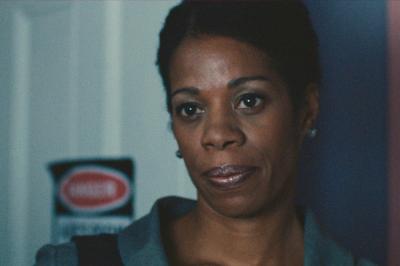
And talk about a powerhouse performance! Look no further than Kim Wayans. Pitch perfect as a woman in denial, and so lost, on so many levels, she garners no sympathy from me as Audrey, which only adds to the power of the performance. Audrey is herself hurting, cold, close-minded and manipulative, hiding behind the Bible. Wayans is so solid in the role that she actually pushes the audience to love and embrace Oduye’s Alike. Very interesting tact to take, but very effective. In speaking with Wayans, her enthusiasm for tackling this very enigmatic and dramatic role is unparalleled. “When this film came along. . .I read it and I was just blown away. It was so beautiful. So beautifully written. Such a powerful story. Such a relevant story. And Audrey just broke my heart…I felt so sorry for her. I was just like, ‘I know I could this role some justice.’ …They had read every actress in town at this point and they weren’t really getting what they were looking for. They said they just kept getting one ‘angry Black mama after the other’ and they really wanted someone to bring Audrey’s vulnerability to the surface.” Wayans succeeds beautifully.
Written and directed by Dee Rees based on her award-winning semi-autobiographical short film of the same name, while the subject matter of a someone struggling with sexual identity is nothing new, it is the grace, humor and honesty that flow through the script which sets PARIAH apart from other films of this nature. PARIAH is more than a story about “coming out”. This is a story about acceptance and the courage to be one’s self with a powerful message – from adversity comes strength. As Adepero Oduye herself opines, “You take away the race. You take away the sexuality. It’s just about identity. No matter where you’re from in the world, no matter your social economic status, people can relate to [this]. People know what it’s like to feel like they don’t belong or try to figure out who they are. Or they’re a parent and have a teenager. On so many different levels you can relate to this story. And that’s really awesome and beautiful to witness that first-hand.”
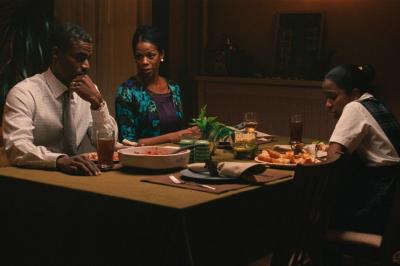
Kim Wayans, herself an accomplished writer and director describes director Dee Rees “as an actress’ dream. She really creates an environment on the set that’s very relaxing and safe so you feel like you can go to those dark spaces and that you’ll be supported and you’ll be protected, which is really really important, especially with a film like this. She has a quiet gentle way about her which actresses appreciate. When she gives you adjustments…she just comes over and whispers something to you, an adjustment that she wants you to make. She’s really good about letting you bring what it is that you’ve prepared. The first take, she lets the actress do the scene you envisioned it. Then she’ll come over and make adjustments. She’s wonderful to work with.” And kudos to Wayans who was never tempted to don her own director’s hat while acting in PARIAH. “You have to be able to separate your roles. When you go into something as an actress, you have to put your director’s cap away or else it just becomes a problem. . .this is not my film to direct. This is my film to give the director what she needs in order to actualize her vision.”
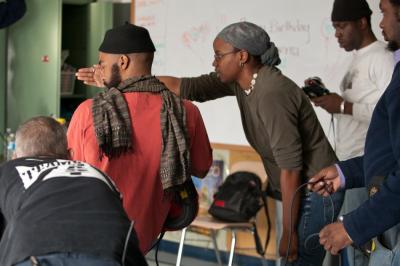
Technically the film is outstanding, particularly when it comes to the Brad Young’s cinematography. Shot in 35mm over 18 days, the lensing is varied between hand-held close-ups and wide angle dolly shots, both which are effectively and appropriately utilized. Using the camera to show relationships and construct dynamics, there is a fluidity to the lensing that moves as it your eye is scanning a room. According to Rees, due to the limited budget of PARIAH, Young even “designed his own lights built them. We really wanted to use the [light] colors to heighten characterizations. Going into it I had an 80 page shot list and Brad and I would sit with the 80 page shot list…and we’d walk around and talk through the scenes. We’d visit locations multiple times so we knew where we were going and we’d do floor plans for the major set-ups so we’d know where the angles are, where the props or furniture need to be.”
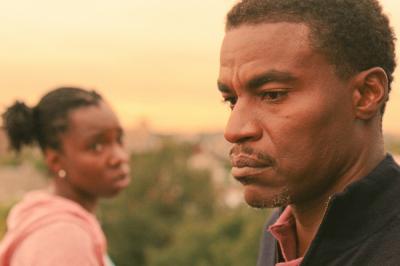
Inbal Weinberg’s production design is used as a very effective tool, aiding to clearly define the characters and their demographic differences as well as to help shape Audrey and the family home life further. This is a great instance where the production design helps fuel a backstory. Following through on the use of lighting color and tone, color within the set design and costuming are also powerful storytelling tools, setting the ambient emotional – and character – tone throughout the film.
While there are a few shortcomings, such as some scenes that are unnecessary or overly extended, particularly those involving the girls’ club, or others involving Arthur and local men in the area that could benefit from enhanced dialogue and “fleshing out”, PARIAH maintains a very lyrical flow built upon good storytelling and filled with magnificent performances that soar.
Alike – Adepero Oduye
Audrey – Kim Wayans
Arthur – Charles Parnell
Written and Directed by Dee Rees.











